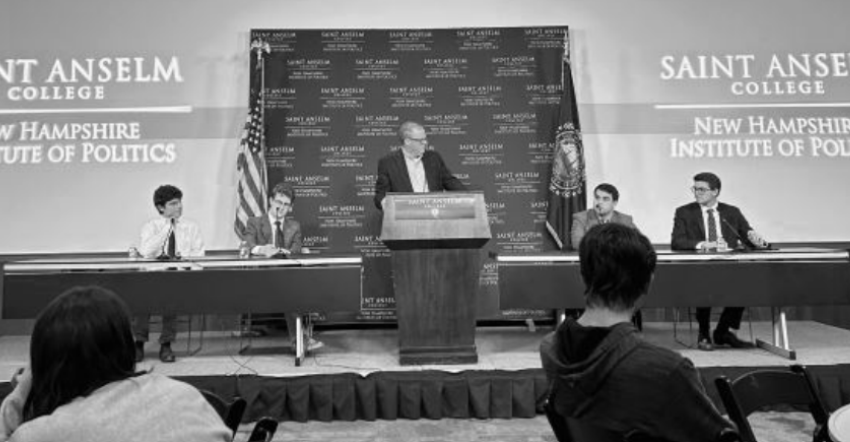On Tuesday Nov. 19, the New Hampshire Institute of Politics (NHIOP) hosted a lively debate between the College Democrats and College Republicans. The event, moderated by NHIOP Executive Director Neil Levesque, featured passionate arguments from each side of the aisle, tackling pressing issues such as American foreign policy, the economy, the judiciary and bureaucracy, and climate change.
The debate opened with reactions from both sides to the recent election of President Donald Trump,in particular his proposal of tariffs on foreign goods, especially those manufactured in China.
The Democrats, who later identified the election as “[coming] down to how Trump stood on a stage after a man almost killed him [more so] than anything with policy,” highlighted the potential risks of implementing tariffs amidst economic challenges.
“To increase jobs,” argued freshman Politics major Michael Katsikis, “we need to have a system in place to make those jobs, and if you effectively jump up prices… that will do way more harm than the tariffs [would].”
While the Democrats expressed hesitation about the policy, the Republicans countered with reserved optimism, emphasizing that transitioning to American-made products could help expand the struggling job market.
“If you increase tariffs on other countries… you’re going to be getting more American-made goods,” sophomore Politics major John Fitzpatrick retorted, adding that “more American-made goods creates a demand.”
Pivoting to the border crisis, Fitzpatrick also expressed appreciation for the economic contributions of undocumented immigrants while acknowledging that Trump’s proposed mass deportation policies may not be the best solution.
“People are looking for jobs, people are thirsting for jobs. If you have people coming across the border, they’re seeking out jobs… if you are contributing, you’re going to pay taxes, you’re going to be a member of the workforce, you should be able to get an expedited [citizenship] process.”
The conversation then shifted to American foreign policy, with Republicans invoking Trump’s “peace through strength” doctrine and criticizing President Biden for failing to project a strong image.
However, Fitzpatrick expressed opposition to Trump’s suggestion of ceding half of Ukraine to Russia, arguing that “peace through strength is telling Putin, ‘Listen, buddy… you’re going to stay over there.’ ”
He continued, “They need to come to the table, because that’s one thing that Biden has not done, [he has] not brought it to the table.” Fitzpatrick suggested that projecting strength could similarly deter a potential Chinese invasion of Taiwan.
Owen Bland, a sophomore International Relations major representing the, disagreed. “I believe we should come to the aid of the people of Taiwan because [they] have been a staunch American ally, and China right now is forcing itself to be the next great world power… but it’s not going to be in Taiwan.”
Bland argued that the Chinese Belt and Road Initiative (BRI), often criticized as a “debt trap,” posed a greater threat. “I think we need to defend Taiwan, but to defend Taiwan, you have to go after China where they are, not where they’re pretending to be… we have to go to Africa, to Eastern Europe. You have to go to the rest of the world.”
On climate change, the Democrats emphasized the urgency of addressing the crisis, while Republicans stressed the current limitations of “green energy” solutions.
Michael “Mac” Connors, a senior Politics major representing the Republicans, noted, “I hope that in the future those are viable options… but at least for right now, they’re not, so until we can make those a viable option on the grand scale, we also need to be realistic.” He added, “We also need to make sure that we are energy independent, and if that means drilling… or building the pipeline through North Dakota, then that needs to be done.”
Bland, voicing Democratic opposition to expanded drilling, highlighted the United States’ role as a global leader. “What is the rest of the world going to think when we tell them to pull their fair share… if we’re just going to start drilling because it’s more convenient for us to have that oil in the short term?”
Looking ahead, both sides agreed on the importance of bipartisanship and maintaining faith in the nation’s institutions to preserve democracy. While neither side had a clear favorite for the 2028 presidential race, the Republicans expressed hope for JD Vance to serve as the “Kamala to Trump’s Biden.”
Similarly, Bland indicated excitement for a potential “Vance-Ryan rematch,” while Katsikis quipped that “a 55-year-old white hardware store owner” might be the ideal candidate.
The event concluded on a hopeful note, with Levesque praising the students’ performance. “This has once again been a great spectacle of [Saint Anselm] students and their abilities on the stage,” he remarked. Levesque closed with a lighthearted comment: “Sometimes I think that the two groups agree a little too much, but [if that] happens on the national scale maybe we can get things done.”


